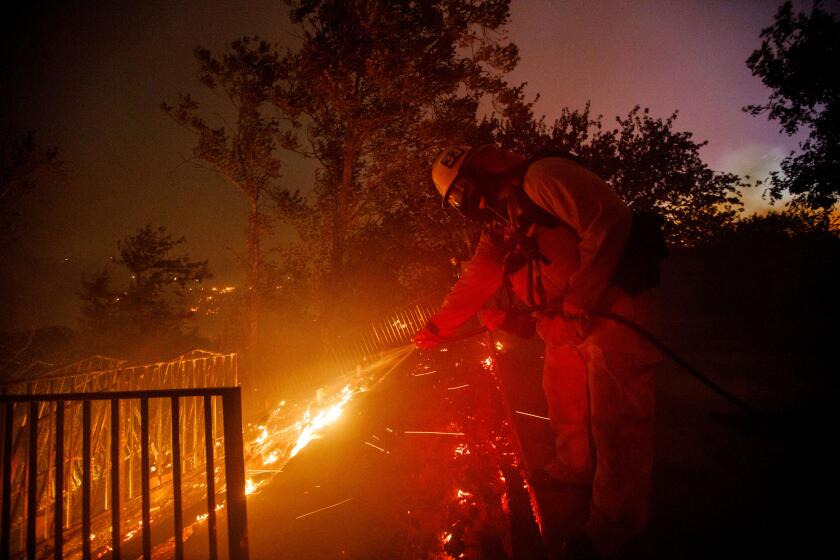Tough talk on Iran from GOP candidates
Listening to the Republican presidential candidates, one would believe there is no foreign policy challenge more threatening to the United States than a nuclear Iran. As the remaining candidates attempt to distance themselves from President Obama and one another, all but one (Ron Paul) has described the prospect of an Iranian nuclear weapons capability as “unacceptable” and endorsed the use of military force if that were necessary to prevent an Iranian bomb.
The most troubling aspect of this default position held by most of the Republican candidates is the complete absence of any details on how the use of force could accomplish this ambitious objective. Consider the sketchy logic offered by each:
Mitt Romney sets the tone, arguing that the Obama administration has been weak in managing an increasingly intransigent and confrontational Iranian regime. “If we reelect Barack Obama, Iran will have a nuclear weapon,” Romney stated unequivocally. “And if you elect Mitt Romney, Iran will not have a nuclear weapon.” He has called for regime change in Iran and, when pressed on how a President Romney would achieve his goals, has said he supports both “covert and overt” actions, including military action if necessary, though he rules out “boots on the ground.”
Rick Santorum has repeatedly called for a preemptive bombing strike on Iranian nuclear facilities as part of his “plan.” He has implied that he would expand the use of covert operations, possibly including targeted killings, against Iranian nuclear scientists: “I will say to any foreign scientist that’s going into Iran to help on their [nuclear] program: You will be treated like an enemy combatant, like an Al Qaeda member.”
Rick Perry has not proposed specific unilateral steps, but when asked in an interview with ABC’s Christiane Amanpour whether he would support a preemptive strike on Iran’s nuclear facilities, he said: “We find ourselves with two really bad positions. We’re either going to allow this madman to have become in control of a nuclear device, or we are going to have a … military strike to keep that from occurring.” He has endorsed a joint U.S.-Israel preemptive strike: “I’ve said we will support Israel in every way that we can, whether it’s diplomatic, whether it’s economic sanctions, whether it’s overt or covert operations up to and including military action.” Perry has also indicated that during the civilian protests in Iran in 2009, the Obama administration should have been “actively involved in taking that oppressive regime out of control of Iran.”
Newt Gingrich explicitly advocates regime change by whatever means necessary. In the short term, he has called for increased sanctions and covert operations to “break the Iranian regime” within a year by “cutting off the gasoline supply to Iran and then, frankly, sabotaging the only refinery they have.” However, he also has said he would support military force as a last resort: “Unless they disarm their entire system, we are going to replace their regime.”
Jon Huntsman Jr., often portrayed as a sober foreign policy hand, is as hard-line on Iran as any of the candidates. When asked if he would deploy U.S. troops to stop a nuclear weapon, the former governor replied: “I can’t live with the implications of not doing it.... You got to have all options on the table. You got to be prepared to use all elements of national power.”
The strategies put forth by the candidates all rest on the assumption that U.S. military action could eliminate Iran’s nuclear program. For military force to be effective, however, there are three core requirements the candidates have not addressed.
First, does the U.S. intelligence community know where every weapons-related nuclear facility is located? As demonstrated by the revelation of a potential hidden uranium enrichment facility near the city of Qom in 2009, it is impossible to know whether Iran is concealing other nuclear facilities.
Second, can airstrikes alone eliminate all nuclear facilities? Even Gingrich acknowledged: “The idea that you’re going to wage a bombing campaign that accurately takes out all the Iranian nuclear program … is a fantasy.”
Last, but certainly not least, have senior leaders in Iran decided to pursue nuclear weapons? Last February, Director of National Intelligence James Clapper admitted: “We do not know … if Iran will eventually decide to build nuclear weapons.”
Initiating a preemptive military strike against Iran to eliminate its suspected nuclear weapons capability would be an enormously significant — and potentially disastrous — foreign policy decision. As the Republican presidential campaign continues, the media and prospective voters must challenge the candidates for greater explanation on this application of military force. In Iraq, the U.S. discovered the enormous costs and consequences of trying to disarm a country through regime change. It is crucial, therefore, that we demand that those running for president clearly articulate a realistic strategy for preventing an Iranian bomb before placing “all options on the table.”
Micah Zenko is a fellow and Emma Welch is a research associate with the Center for Preventive Action at the Council on Foreign Relations.
More to Read
A cure for the common opinion
Get thought-provoking perspectives with our weekly newsletter.
You may occasionally receive promotional content from the Los Angeles Times.






